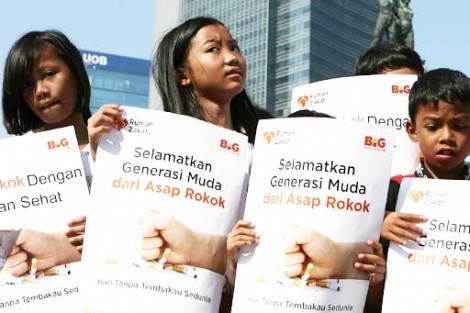Popular Reads
Top Results
Can't find what you're looking for?
View all search resultsPopular Reads
Top Results
Can't find what you're looking for?
View all search resultsChild commission accuses cigarette firm of ‘exploiting’ children
The KPAI says the firm's badminton talent-scouting program constitutes “child exploitation” by making participants wear T-shirts emblazoned with the company's logo as a form of brand promotion.
Change text size
Gift Premium Articles
to Anyone
A
mid concerns about pervasive smoking among minors in the country, the Indonesian Child Protection Commission (KPAI) has set the stage for confronting PT Djarum, saying the cigarette giant’s well-known badminton talent scouting program constituted “child exploitation”.
The KPAI claimed recently that around 23,600 children aged 6 to 15 years had been exploited since 2008 by making them wear T-shirts emblazoned with their logos as a form of brand promotion. Djarum, meanwhile, insisted the program reflected its dedication to sports development and no sales were involved at events it sponsors.
“Children are used as part of marketing without being aware of it. Children should be kept away from danger, but instead [in the case of Djarum], they are used as a promotional agent,” KPAI commissioner Sitti Hikmawatty said.
Djarum’s support for sports dates back to 1969, when it started the Djarum Badminton Club at its headquarters in Kudus, Central Java. The Djarum Club has since produced world-class players who won national and international competitions from Sudirman to the Olympics.
In 2018, the audition held under the Djarum Foundation garnered 5,987 participants, 13 times more than the 448 participants counted in 2008. According to the company’s website, 245 of the participants received scholarships.
A KPAI survey also indicated that 68 percent of children under the age of 18 participating in the Djarum sporting program perceived the T-shirt logos as the cigarette brand instead of the name of a badminton competition.
“The winners of the audition are actually not the kids who receive the scholarships, but rather the audition’s organizers, as they build a future market for cigarettes through a positive image of the company as if they care [about the children],” said Lisda Sundari, who heads the Children's Lantern Foundation, one of the nine other organizations filing reports on the same issue with the KPAI.
The KPAI argued that Djarum had violated a 2012 government regulation on additives that prohibits the involvement of children in cigarette-sponsored events and the use of tobacco trademarks or product logos that include its brand image.
It also highlighted the 1990 UN Conventions on the Rights of the Child, which requires the government and third parties to push for child protection with regard to tobacco control.
The KPAI and the coalition of nine NGOs appealed to PT Djarum to stop involving children in its events, urged the government to enforce the law and called on the public to be aware of the hidden messages behind the company’s sporting campaign.
KPAI commissioner Sitta said the commission had raised the issue with the Djarum Foundation but the management had “insisted that the program is beneficial for the country”.
Djarum corporate communication manager Budi Darmawan rejected any insinuation that the auditions were marketing events, since the event involved no cigarette sales.
“Children know that they are here for a talent-scouting event […] And it is the parents that take their kids here. They know that they are attending a badminton club event and not a cigarette-sponsored championship,” Budi said.
He criticized the KPAI for omitting the words “badminton club” in its disapproval of the Djarum logo on the event’s jerseys.
“If other companies can form a badminton club, why can’t we?” Budi asked.
Meanwhile, while the 2012 government regulation cited by the KPAI prohibits the inclusion of children in promoting tobacco products, criminal law expert Hamdi said the probability of suing the company would be a “long way to go" since the law lacked criminal sanctions.
Even the 2002 Law on Child Protection provides a vague definition of exploiting children “economically or sexually”, he said.
“It all depends on the expert witness, but then this is not strong enough […] I suggest a revision [of the law] to make it more specific, so that it can sanction child exploitation through brand promotion via jerseys,” Hamdi said.
The 2018 Basic Health Survey indicated that 9.1 percent of people aged 10 to 18 years in Indonesia were smokers, a far cry from President Joko “Jokowi” Widodo’s National Medium-Term Development Plan, which aims to reduce the figure to 5.4 percent by 2019.
The National Development Planning Board also painted a grim picture last year, predicting that the prevalence would only grow further, namely to 10.7 percent in 2019, 15 percent by 2024 and 16 percent by 2030. (mai)










